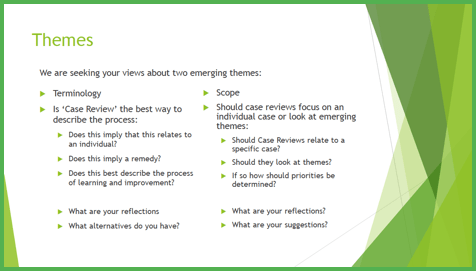By Dr Minh Alexander, NHS whistleblower and former consultant psychiatrist 29 December 2018
The Freedom To Speak Up Review on NHS whistleblowing was a sop to public opinion, which in reality protected the government and allowed continuing control of information against the public interest.
The Review made weak recommendations, but even these have been watered down by the CQC and National Guardian, without demur by the Department of Health and Social Care.
The National Guardian’s Office has moved away from its original primary function of helping individual whistleblowers in serious difficulties, to making vague recommendations for culture change.
The National Guardian has avoided thorny issues of personal accountability for whistleblower reprisal, and even denied on a national broadcast that there were “bad guys”.
The National Guardian’s Office has also acted arbitrarily in its handling of requests for case review. It has allowed whistleblowers to be seriously harmed by refusing to accept cases on questionable grounds. Alongside this, the National Guardian failed to review the handling of patient safety concerns in these cases.
At Brighton and Sussex, the National Guardian protected a favoured NHS trust board by arbitrarily delaying case review for many months, whilst the Brighton and Hove coroner continued to issue warnings about lethal poor care:
Coroner’s report to Prevent Future Deaths on Rita Giles 11 July 2018
Coroner’s report to Prevent Future Deaths on Ronald Harman 19 July 2018
Report 20 September 2018 of coroner’s intention to issue a PFD on death of Joan Blaber
The list of preceding coroner’s warnings was already lengthy. Brighton and Sussex University Hospitals NHS Trust has generated one of the highest numbers of coroners’ warnings nationally.
| There were 21 published coroners’ reports to Prevent Future Deaths (PFDs) which related to BSUH between February 2014 and April 2017:
Stephen Palmer 25/02/14, 2014-0072 – copied to Secretary of State for Health Herta Woods 26/02/14, 2014-0081 – copied to Secretary of State for Health John Adams, 1/07/14, 2014-0293 – copied to Secretary of State for Health Martin Hill, 22/08/14, 2014-0382 – copied to Secretary of State for Health Linda Rignall, 19/09/14, 2014-0414 – copied to Secretary of State for Health Isaac Bahar, 15/06/15, 2015-0229 – copied to Secretary of State for Health Evelyn Kennedy7/05/15, 2015-0178 – copied to Secretary of State for Health Anthony Geerts, 24/06/15, 2015-0240 – copied to Secretary of State for Health Thelma Jones, 12/08/15, 2015-0318 – copied to Secretary of State for Health Marion Howes, 11/02/16, 2016-0046 – copied to Secretary of State for Health Geoffrey Moyse, 20/02/16, 2016-0067- copied to Secretary of State for Health Graham Watts, 3/04/16, 2014-0149 – copied to Secretary of State for Health Jack Molyneux 29/04/16, 2016 – 0168 – copied to Secretary of State for Health Christine Street, 10/05/16, 2016 – 0177- copied to Secretary of State for Health Jean Stockley, 12/08/16, 2016 – 0286 [17 August 2016 CQC placed the trust into special measures] Diana Ritchie, 18/08/16, 2016 – 0296 – copied to Secretary of State for Health Leslie Lerner, 28/10/16, 2016-0487 – copied to Secretary of State for Health Mary Muldowney, 8/12/16, 2016-0440 Raymond Pollard, 25/01/17, 2017-0023 – copied to Secretary of State for Health Ronald Bennett, 5/04/17, 2017-0097 – copied to Secretary of State for Health Patricia Webb, 20/04/17, 2017-0130 – copied to Secretary of State for Health
|
The National Guardian finally announced a case review on 21 December 2018 as follows:
“The purpose of the review is to support the trust to develop its speaking up culture, by identifying any areas for improvement and commending good practice”
As the trust’s CEO Marianne Griffiths features in today’s New Year’s Honours list as a new Dame, “For services to the NHS”, what is the betting that the eventual case review report on Brighton and Sussex will lean towards “commending good practice”?
I have been in correspondence with the National Guardian and her Office about her case review exclusion criteria.
This has resulted in disclosure of suggestions by her Office to dilute its case review process even more:
National Guardian Presentation 7 September 2018 on revision of case review process and criteria
These are the key suggestions from this presentation by her Office on 7 September 2018:

There has been reluctance by her Office to clarify whether and how it will consult on any new case review process. I am pressing for full, open consultation.
If you agree there should be open consultation, you can make a request to the National Guardian’s Office via this general address: enquiries@nationalguardianoffice.org.uk
In the meantime, this is my initial feedback to the National Guardian in response to the above suggestions:
| 1. I think you should remain grounded in the original reasons why your Office was proposed by Robert Francis – it was proposed primarily to benefit NHS whistleblowers who had no place to go, regarding the handling of their concerns.
2. Francis also proposed that your Office should use its influence to ensure redress for harmed whistleblowers and patients who had suffered as a result of poor whistleblowing governance, page 168 Freedom To Speak Up Review:
“7.6.12 The INO should be authorised by these bodies to use his/her discretion to:
• review the handling of concerns raised by NHS workers where there is cause for concern in order to identify failures to follow good practice, in particular failing to address dangers to patient safety and to the integrity of the NHS, or causing injustice to staff • to advise the relevant NHS organisation, where any failure to follow good practice has been found, to take appropriate and proportionate action, or to recommend to the relevant systems regulator or oversight body that it make a direction requiring such action.
This may include: – addressing any remaining risk to the safety of patients or staff – offering redress to any patients or staff harmed by any failure to address the safety risk – correction of any failure to investigate the concerns adequately” 3. I am very concerned that your Office has been drifting away from the core focus of righting wrongs in individual cases, to just learning general lessons that arise from cases. 4. A particularly serious concern is the continuing denial by your Office that it has any remit for helping to ensure redress when this is plainly part of the original intention and was a principle accepted by the government. Redress in this context was clearly intended to be a patient safety mechanism, and it is disturbing that your Office has not accepted this. 5. I am even more concerned now to see the suggestion that your Office could de-couple itself entirely from focus on specific cases and look at themes. In seeking to drop even the term “case review”, your Office marginalises whistleblowers even more and the fate of individual whistleblowers and patients harmed by suppression is given even less importance. This is serious mission drift. 6. I believe that if you continue to leave injustices uncorrected, this will be very damaging to Speaking Up culture. In time, these injustices will accumulate and be apparent to all, no matter what staff are told through official briefings. 7. You stated in your latest annual report that the victimisation of staff who speak up must stop: “This type of behaviour has to stop.” Statements are not enough and your Office needs to take proactive measures as set out originally in the report of the Freedom To Speak Up Review, to help reverse harm to whistleblowers and patients in specific cases. 8. I repeat my request that you stop the blanket exclusion of cases from review on the basis that there is an active employment process. This excludes the most serious cases for years, as they languish in the Employment Tribunal. It is vital that all issues relating to poorly handled patient safety issues are examined as a matter of priority, whether or not you side step the employment issues. Although I think the latter would be a shame, as whistleblower detriment is also ultimately relevant to patient safety. Inaction and delay allow great harm to be wreaked in whistleblowing cases, and early intervention was acknowledged to be important by the Freedom To Speak Up Review (Principle 8 and Principle 9).
|
RELATED ITEMS
CQC’s Victimisation of Whistleblowers: Failure to Investigate Concerns
A Study in Delay: The National Guardian & Brighton and Sussex University Hospitals NHS Trust
Replacing the Public Interest Disclosure Act (PIDA)
What could a new whistleblowing law look like? A discussion document



I love this Minh. Though we knew this office to be a sham, only you could have shown it to be as childish as it is. Dr Hughes is playing with her new toy, avoiding anything difficult or unpleasant, while continuing to wear a “smiling but concerned” expression, – the only evidence that she knows there might be something serious involved! Well done yet again.
LikeLiked by 1 person
Very difficult to imagine those who’ve been repeatedly rewarded for only ever protecting the powerful at the expense of the abused to do anything other than continue in that self-serving vein.
These creatures should be held to account; their motives probed, their effectiveness measured in a meaningful way. But, it would seem, there is a dearth of those with sufficient insight, strength and power to do so.
Thank you very much for your efforts – shame on the great and the good for being anything but.
LikeLike